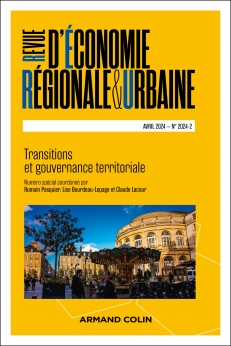
REVUE D'ÉCONOMIE RÉGIONALE ET URBAINE (2/2024)
Pour acheter ce numéro, contactez-nous
Recevez les numéros de l'année en cours et accédez à l'intégralité des articles en ligne.
En interrogeant la présence du care dans la politique de soutien à l’entrepreneuriat en quartier prioritaire, l’article décentre le regard des logiques marchandes et instrumentales pour s’intéresser à l’attention portée à autrui dans les activités économiques. Pour ce faire, il s’intéresse aux liens interpersonnels de soin qui organisent l’action et l’accompagnement entrepreneuriaux en s’appuyant sur une enquête de terrain qualitative menée entre 2018 et 2020. En se nourrissant de travaux qui mêlent la géographie des inégalités aux sciences de gestion critiques, celle-ci révèle des pratiques implicites de soin de la part de conseillers et d’entrepreneurs. Bien que ces pratiques de care fondent un rapport de sollicitude aux autres et au monde qui s’oppose à l’image d’un entrepreneuriat individuel et marchand, elles restent d’ordre interindividuel et réduisent peu les inégalités structurelles.
By questioning the presence of care in the business support policy in priority neighborhoods, this article shifts the focus from market and instrumental logics to the attention paid to others in economic activities. To do so, it focuses on the interpersonal bonds of care that organize entrepreneurial action and support. It is based on a qualitative field survey conducted between 2018 and 2020 during a Ph.D in urban studies, in the Nantes metropolitan area and Paris suburbs. I observed the actions of advisors working in business support associations which are located in priority neighborhoods, where specific policies are implemented to reduce economic, social and urban inequalities. I also observed the actions of supported entrepreneurs to understand their ideas and their practices of entrepreneurship. Drawing on work that blends the geography of inequalities with critical management sciences, the results reveal implicit daily practices of care on the part of advisors and entrepreneurs. These practices generate a mutual assistance relationship to human beings in depreciated territories. The advisors care about the specific needs of precarious entrepreneurs and take care of them by adapting their actions of support. The entrepreneurs care about discriminated people to whom they feel close and take care of them by creating adapted services and products. Although these care practices form the basis of a relationship of solicitude to others and to the world that opposes the image of an individualistic and productivist entrepreneurship, they remain inter-individual and heteregeneous. Consequently, they do little to reduce structural inequalities, or even reproduce them.